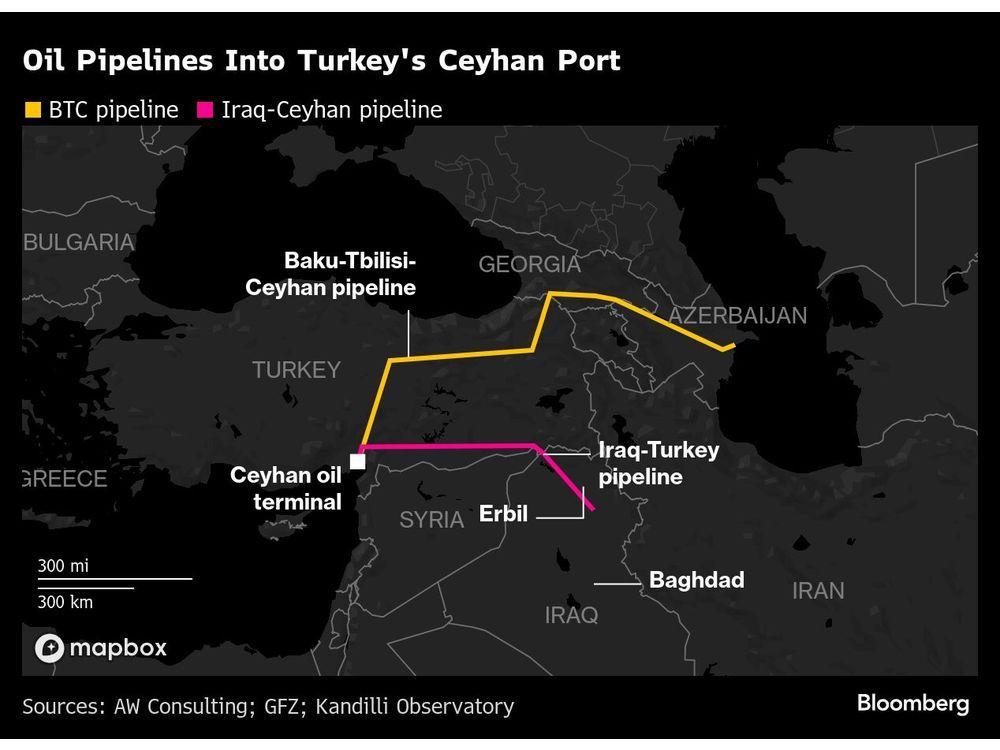Business
US Works to Secure Long-Term Kurdish Oil Exports After Deal

The Trump administration is actively working to ensure the long-term viability of oil exports from northern Iraq, which recently resumed after a two-year suspension. The goal is to bolster the Iraqi economy, provide opportunities for US companies, and counter Iranian influence in the region. According to a senior State Department official, who requested anonymity, the focus is on implementing the export agreement and ensuring that its financial terms are upheld.
Efforts to facilitate this deal involved extensive coordination between international oil companies and both the Iraqi and Kurdish governments. The official noted that hundreds of phone calls and meetings were conducted in recent weeks to bring the agreement to fruition.
Strengthening the Export Pact
The United States played a crucial role in facilitating the deal that allows for shipments to resume through a pipeline connecting to Turkey’s Mediterranean coast. The current agreement is set to last until the end of 2023, with discussions planned regarding the hundreds of millions of dollars owed to the participating companies. Additionally, Turkey is advocating for new terms concerning the transportation of crude oil.
Secretary of State Marco Rubio expressed in a recent post on social media that the agreement will yield tangible benefits for both Americans and Iraqis while reinforcing Iraq’s sovereignty. US pressure has been a significant factor in the establishment of the export deal, and there is now a concerted effort to transition this pact into a sustainable long-term arrangement that will safeguard the interests of US businesses.
Despite the US efforts, the oil ministries of Iraq and the Kurdistan region did not respond to inquiries regarding the US involvement in the negotiations. The Association of the Petroleum Industry of Kurdistan, representing various companies in the sector, welcomed the agreement that has enabled oil exports through the pipeline.
Recent Challenges and Strategic Implications
Since the Turkish pipeline closure in March 2023, some Kurdish oil has been transported to Iran and Turkey via trucks as alternative market solutions were sought, according to the US Energy Information Administration. In July, discussions to resume exports gained momentum, although the Kurdistan region faced attacks on its oil infrastructure, which Kurdish security forces attributed to Iran-backed militias. No group has claimed responsibility for these incidents.
The resumption of oil exports from Kurdistan also serves to mitigate a potential decrease in Iranian oil exports. The US has stated its intention to cut Iranian oil exports to zero as part of President Donald Trump’s “maximum pressure” campaign against Tehran.
With these developments, the US aims to not only support the Iraqi economy but also to create a more stable and secure energy landscape in the region, aligning with its broader strategic interests.
-

 Politics4 weeks ago
Politics4 weeks agoSecwepemc First Nation Seeks Aboriginal Title Over Kamloops Area
-

 World5 months ago
World5 months agoScientists Unearth Ancient Antarctic Ice to Unlock Climate Secrets
-

 Entertainment5 months ago
Entertainment5 months agoTrump and McCormick to Announce $70 Billion Energy Investments
-

 Science5 months ago
Science5 months agoFour Astronauts Return to Earth After International Space Station Mission
-

 Lifestyle5 months ago
Lifestyle5 months agoTransLink Launches Food Truck Program to Boost Revenue in Vancouver
-

 Technology3 months ago
Technology3 months agoApple Notes Enhances Functionality with Markdown Support in macOS 26
-

 Lifestyle3 months ago
Lifestyle3 months agoManitoba’s Burger Champion Shines Again Amid Dining Innovations
-

 Top Stories2 months ago
Top Stories2 months agoUrgent Update: Fatal Crash on Highway 99 Claims Life of Pitt Meadows Man
-

 Politics4 months ago
Politics4 months agoUkrainian Tennis Star Elina Svitolina Faces Death Threats Online
-

 Sports5 months ago
Sports5 months agoSearch Underway for Missing Hunter Amid Hokkaido Bear Emergency
-

 Politics5 months ago
Politics5 months agoCarney Engages First Nations Leaders at Development Law Summit
-

 Technology5 months ago
Technology5 months agoFrosthaven Launches Early Access on July 31, 2025





















